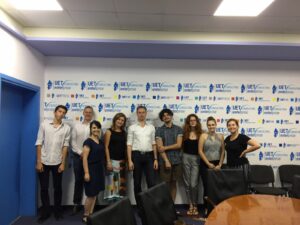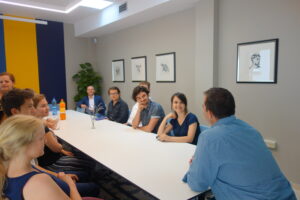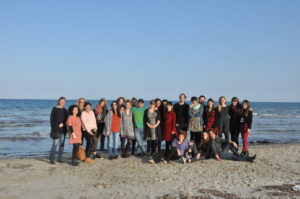IAPSS-CIFE Winter School 2018
“The MENA Region in International Relations:
Power, Politics and Ideology”
Organised by the International Association for Political Science Students (IAPSS) in cooperation with the Centre International de Formation Européenne (CIFE)
in Tunis, Tunisia
19th – 25th of February 2018
(Arrival Day: 18 February / Departure Day: 26 February)
Important Note: Please use the form at the bottom of this page to submit your application. Applications will be scanned and evaluated from December 1st onwards and applicants will be notified on admission until December 7th. Late applications are possible and accepted on a rolling basis, but have no guarantee to be considered in the assessment process. A timely submission of the application is advised.
The Theme
This IAPSS-CIFE Winter School examines the variety in social, political and economic conditions of countries in the Middle East and North Africa (MENA) and its implications on the Arab uprisings and vice versa. The Winter School will focus on case studies from our host country Tunisia but will also look beyond its borders. The Winter School allows students to gain in-depth knowledge of the region through lectures from academics as well as local and international NGO’s. We will also apply the newest the methods such as design thinking for policy-making.
The head topic “The MENA region in International Relations: Power, Politics and Ideology“ features the following four subtopics:
(1) Democratization and Regime Changes in the Aftermath of the Arab Spring
This topic is important to understand the domestic and regional factors that have led to the perceived failures and successes of the Arab uprisings of 2011. It also serves to understand why some countries did not witness an uprising at all despite initial protests and are still resilient to potential uprisings.
(2) Political Economy and Economic reform in the MENA-Region: Labor, Rents and Capital
This subtopic deals with the political economy in different sectors and policy fields. It explores the major developmental challenges in the region, such as long-term growth trends, demographic change, education, labor markets, urbanization, water and agriculture.
(3) Security and Power Politics: New Perspectives on Regional Hegemony
Geopolitics play a large role in the domestic situation of countries that are going through a political and social transition. This subtopic offers a macro perspective on the MENA region and aims to set the Arab uprisings in an international context. The question of how far regional issues influence domestic politics is important to understand why countries do what they do and how alliances in the Middle East are formed.
(4) Technology and Telecommunication: Creation and Decay of Revolutions
This topic focuses on the history of technology in resistances in the Middle East and North Africa; how it has developed itself and influenced the political participation. Topics such as telecommunication policy, intelligence and domestic security or digitization may be covered by this subtopic based on the interest of participants.
Speakers
Youssef Cherif is Deputy-Director of Columbia Global Centers | Tunis. Youssef is a member of Carnegie’s Civic Activism Network, and a Valdai Club expert. He was previously the Al-Maidan Libya Project manager at the Institute for War and Peace Reporting (IWPR), and an expert affiliated to the Tunisian Institute for Strategic Studies (ITES). He consulted for the Arab Institute for Business Managers (IACE, on Tunisian foreign policy), the UN (implementing the SDG’s in Tunisia and writing the country report), The Carter Center in Tunisia (political affairs), etc. Youssef holds a Chevening Master of Arts in International Relations from the Dept. of War Studies of King’s College London, and a Fulbright Master of Arts in Classical Studies from Columbia University.
Dr. Adam Hanieh is a senior lecturer at the School of Oriental and African Studies (SOAS), University of London and the author of Lineages of Revolt: Issues of Contemporary Capitalism in the Middle East. Prior to joining SOAS, Adam taught at Zayed University, United Arab Emirates. From 1997-2003, he worked in the NGO and public sectors in Ramallah, Palestine, where he completed an MA in Regional Studies at Al Quds University. He holds a PhD in Political Science from York University, Canada (2009). His research interests include political economy of the Middle East; labour migration; class and state formation in the Gulf Cooperation Council; Palestine. He is an international advisory board member for the journal Studies in Political Economy.
Dr. Mohamed Limam is Assistant Professor in Political Science at the University of Jendouba, Tunisia, and a Research Associate at the BORDERLANDS Project, Robert Schuman Centre for Advanced Studies. His main areas of interests and expertise are EU migration policy toward the Maghreb countries and Tunisian politics. He is one of 246 country experts who contributed to the last edition of the Transformation Index, BTI 2016 and the country report on Tunisia of the Bertelsmann Stiftung. He holds a PhD in Political Science from the Faculty of Law and Political Science, Al-Manar University, Tunis.
Dr. Pawel Pustelnik holds a PhD from Cardiff University. He graduated from Social Science Research Methods Masters at Cardiff University as well as from Masters in Global Environmental Governance at Free University in Amsterdam. He also studied International Relations and Diplomacy (BA) at Wroclaw University, Wyszynski University in Warsaw and La Sapienza in Rome. Pawel will be the Lead Coach for the Research Labs and aims to develop bulletproof research proposals with the students.
Florian Zabel works in the areas of innovation management and project design for the German Development Agency (GIZ) in Berlin. Florian holds a Master’s in Political Science and International Development from Humboldt-University of Berlin and Sciences Po Paris. Additionally, he has been educated at the School of Design Thinking of the Hasso-Plattner-Institute and seeks utilize Design Thinking for policy reform and governance innovation. Previously, he has lived in Egypt and Jordan working for GIZ and UNDP on innovation and digitalization in different policy areas (esp. financial, economic and social policy). Florian will be Lead Coach for the Policy Labs focusing on tackling urgent policy challenges in the MENA region with a design thinking approach.
Programme and Venue
This year’s IAPSS-CIFE Winter School will be held in cooperation with the Centre International de Formation Européenne (CIFE) in Tunis enabling all participants to dive into a week-long programme with various components: lectures, seminars, research and policy labs. In the evenings we have planned a documentary screening related to the theme of the Winter School as well as social activities to let off steam after the academic programme.
Tunisia lends itself as a perfect destination to explore the changing political reality in the Middle East and North Africa and its underlying causes. Furthermore, it is interesting to examine the process of democratization in Tunisia, which is considered to be the only true democracy in North Africa after the downfall of its authoritarian regime. If you are eager to learn more about the subtopics that this year’s Winter School is going to present, make sure you submit your application within the deadline to enjoy the stimulating academic programme prepared in cooperation with the leading experts in the theme. What is more, you will have a chance to meet fellow students from all over the world and experience Tunisia’s rich and hospitable culture.
Application and Selection Process
Students and junior researchers of all levels, but preferably at least at an advanced level of their undergraduate studies, are invited to submit their applications.
Individuals interested in participating in the IAPSS-CIFE Winter School 2018 are requested to submit a written application containing a CV, a letter of motivation (max. 1 page). Your letter of motivation should state at least (a) your previous experiences with the topic, (b) your motivation for joining this Winter School, and (c) how this Winter School would contribute to your development. Be creative! Please note that the application process is competitive due to a limited number of tickets. Decision on admission is mainly based on the motivation letter, which is why we encourage applicants to put a special emphasis on this document.
Please use the form below (at the bottom of this page) to submit your application. In case of any questions, please do not hesitate to contact the Organizing Committee (see below) who will be glad to answer them.
What Can Participants Expect?
An academically challenging programme consisting of lectures, seminars and hands-on workshops in a highly interactive and vibrant setting contributing to the personal and academic development of each participant. Lab-formats will apply design thinking for rapid prototyping of research proposals and policy strategies.
Discussing and debating with a range of experts in the field of the MENA region and across different policy fields as well as getting first-hand insights on their current research and teaching methods.
Meeting fellow students and researchers from all over the world interested in a joint multi-perspective examination of the topics addressed.
Exploring sprawling Tunis and its surroundings as well as a variety of social events.
What else to expect? Much more!
Participation Fee and Requirements
IAPSS events are designed to be socially, culturally, religiously and politically inclusive by bringing students of political science and related disciplines from various academic backgrounds, political contexts, level of studies, age and gender together. This aims to create an interactive and multidisciplinary space of social and academic debate and interaction. Taking into account global income disparities, the IAPSS-CIFE Winter School 2018 seeks to offer a student-friendly, low-cost participation fee of €199. Travel and accommodation costs are not included in the participation fee. Students from local Tunisian universities (exl. expats) can apply for a tuition waiver. Please write to Farieha Mirzada at seasonalschools@iapss.org if you would like to apply for a waiver. Applications for waivers will be considered after the application for the Winter School has been completed.
This participation fee includes access to all lectures, workshops, participation in a research OR policy lab and social events, all Winter School materials, a personal IAPSS-CIFE Winter School 2018 participation kit, and an official Certificate of Participation and a Certificate Supplement stating the details of your achievements. However, please consult with your programme coordinator, if the school can be accounted for your regular studies. IAPSS is supportive in case any further documentation is needed.
The participation fee has to be transferred in advance in order to confirm your participation, but only after you have been notified on successful selection. The payment can be done via credit card, PayPal and other devices through the IAPSS Webstore (the details for the transfer will be available there upon acceptance). After admission, the fee should be transferred by December 31st, 2017. Later payments are possible upon request and individual agreement.
Please note that IAPSS does not offer any discount or scholarship for this event (with the exception of Tunisian residents). We recommend consulting with your university/academic institution for individual financial support for participation and travel costs. Also, a range of foundations and academic institutions offer grants and scholarships for seasonal schools. IAPSS can provide an acceptance letter to support external grant/scholarship applications of the participants.
IAPSS Membership is required in order to participate in the programme. IAPSS Membership comes at only €15.00 (for citizens of Europe incl. Russia and Turkey, the United States, Canada, Israel, New Zealand, Australia, Japan, South Korea, Singapore and Malaysia) or €10 (for all other countries) per year (discounted rates for two-year membership are available for €25 and €15 respectively) and offers you a wide range of benefits, including priority access to IAPSS Conferences, and IAPSS Study Trips as well as the opportunity to apply for membership in one of the IAPSS Student Research Committees or the Authorial Board of IAPSS’ academic blog A Different View. Also, members receive the biweekly IAPSS News & Opportunities.
Find all information on the services we provide and how to purchase IAPSS membership here.
Your Organizing Committee
Ms. Farieha Mirzada
Head of Winter School
Leiden University
Mr. Thierry Smit
Seasonal School Coordinator
Leiden University
Youssef Cherif is Deputy-Director of Columbia Global Centers | Tunis. Youssef is a member of Carnegie’s Civic Activism Network, and a Valdai Club expert. He was previously the Al-Maidan Libya Project manager at the Institute for War and Peace Reporting (IWPR), and an expert affiliated to the Tunisian Institute for Strategic Studies (ITES). He consulted for the Arab Institute for Business Managers (IACE, on Tunisian foreign policy), the UN (implementing the SDG’s in Tunisia and writing the country report), The Carter Center in Tunisia (political affairs), etc. Youssef holds a Chevening Master of Arts in International Relations from the Dept. of War Studies of King’s College London, and a Fulbright Master of Arts in Classical Studies from Columbia University.
Dr. Adam Hanieh is a senior lecturer at the School of Oriental and African Studies (SOAS), University of London and the author of Lineages of Revolt: Issues of Contemporary Capitalism in the Middle East. Prior to joining SOAS, Adam taught at Zayed University, United Arab Emirates. From 1997-2003, he worked in the NGO and public sectors in Ramallah, Palestine, where he completed an MA in Regional Studies at Al Quds University. He holds a PhD in Political Science from York University, Canada (2009). His research interests include political economy of the Middle East; labour migration; class and state formation in the Gulf Cooperation Council; Palestine. He is an international advisory board member for the journal Studies in Political Economy.
Dr. Mohamed Limam is Assistant Professor in Political Science at the University of Jendouba, Tunisia, and a Research Associate at the BORDERLANDS Project, Robert Schuman Centre for Advanced Studies. His main areas of interests and expertise are EU migration policy toward the Maghreb countries and Tunisian politics. He is one of 246 country experts who contributed to the last edition of the Transformation Index, BTI 2016 and the country report on Tunisia of the Bertelsmann Stiftung. He holds a PhD in Political Science from the Faculty of Law and Political Science, Al-Manar University, Tunis.
Dr. Pawel Pustelnik holds a PhD from Cardiff University. He graduated from Social Science Research Methods Masters at Cardiff University as well as from Masters in Global Environmental Governance at Free University in Amsterdam. He also studied International Relations and Diplomacy (BA) at Wroclaw University, Wyszynski University in Warsaw and La Sapienza in Rome. Pawel will be the Lead Coach for the Research Labs and aims to develop bulletproof research proposals with the students.
Florian Zabel works in the areas of innovation management and project design for the German Development Agency (GIZ) in Berlin. Florian holds a Master’s in Political Science and International Development from Humboldt-University of Berlin and Sciences Po Paris. Additionally, he has been educated at the School of Design Thinking of the Hasso-Plattner-Institute and seeks utilize Design Thinking for policy reform and governance innovation. Previously, he has lived in Egypt and Jordan working for GIZ and UNDP on innovation and digitalization in different policy areas (esp. financial, economic and social policy). Florian will be Lead Coach for the Policy Labs focusing on tackling urgent policy challenges in the MENA region with a design thinking approach.
This overview of frequently asked questions aims to provide you with detailed information on the application and admission process. Please feel free to raise any additional question or clarification by sending us an eMail to seasonalschools@iapss.org
Pre-Application Information
1) How much is the participation fee?
The participation fee is 199,00€. Our staff is working voluntary to organize the school to maintain a student-friendly price while offering a program that can compete with leading seasonal schools programs for political sciences students. Therefore, the paid amount will be spent directly on the program: venue, lecturers, workshop conductors, materials, etc. Next to these shared costs, it also includes individual costs for social events. Our events are organized from students for students.
2) Who is eligible to apply?
The majority of students are in the advanced undergraduate and master’s level, which also equals the core target group of IAPSS. Young professional and early PhD candidates may also join from universities all over the world based on the assessment of their motivation. Participants usually already have already a strong interest in the respective topic or contemplate to seek it as their academic and/or professional specialization afterwards. Based on our experience, participants were able to use our program to get clarity on their future career by finding a branch for future studies, a platform for publications or getting active in IAPSS itself. The possibilities are vast and individuality is a high value in our programs. Our staff will make sure that you gain most out of your experience with us.
3) Is the program too academically challenging for me?
Don’t underestimate yourself. Even a PhD candidate on geopolitics has maybe never dealt with political Islam, while you may already be an expert in the field as an advanced undergraduate, because you wrote your bachelor’s thesis and multiple course papers on this topic. Our didactical concept will enable a fruitful discussion beyond academic level. However, the selection process will be highly competitive. Our selection committee will take care of an adequate academic, regional and gender balance. And by the way: We will not be just sitting in a class room, but we will also explore Tunis as much as we can! Please also note: The program is highly interactive and requires the willingness to engage in group work. Every participant is obliged to participate in a lab format (research track or policy track) and is supposed to deliver a group output on the last day of the program.
5) Do I need to take part in a so-called lab format?
Yes, it’s obligatory. Don’t be scared! The aim of the lab formats is to gather people with the same interests in the Middle East and North Africa – only separate by the approach they are taking (research or policy). The coordinators on-site will guide you through the two day long group setting. The working groups are also an opportunity to experience an entirely new field and engage in co-creative processes.
6) What are the language requirements?
The program is entirely conducted in English. Student whose mother tongue is not English do not need to submit an evidence of English language, but we count on your self-evaluation. A well written motivational letter is already a good indicator to assess someone’s language skills. Our program has a limited amount of spots to offer highly interactive sessions with in-depth and fruitful discussions – good English skills are obligatory for successful participation. Participants are requested to ‘participate’ actively in the sessions and should be able to communicate sufficiently in English. If you have any official certificates or scores, feel free to mark them in your CV in the application process and/or upload them for us.
7) Is there an application fee?
No, IAPSS does not charge an application fee. In case any fraud cases come to your notice, please contact us immediately.
8) Is accommodation provided?
No, since the past has shown that different participants have different needs and budgets. We recommend to use ordinary booking platforms such as booking.com, Airbnb and hostelworld to browse for accommodation and book accordingly. In the month of February, prices for accommodation are modest. Also think about more social accommodation options such as couchsurfing. In your admission mail, you will find a link to a facebook group, where you can connect to other participants. Use this forum to seek fellows for a shared apartment – past experience has also shown that 10 people gather to rent an apartment and pay a very low daily rate.
Selection Process
1) How long will it take until I know if I have been accepted to the program?
Applications will be reviewed after the deadline within seven working days. Please note that we will only review complete applications including the required documents.
2) How will I be notified about the outcome of my application?
We will notify you via eMail as soon as a decision is reached. Please make sure that you are regularly checking your eMails in this period. There might be a small amount of people who will be placed on a waiting list and will be notified respectively with further information on this procedure.
3) I would like to travel and explore the city instead of attending lectures. Is this possible?
We will not coerce anyone to stay in the seminar rooms, if the person does not wish so. However, you will be investing time and money in this school, and attending the programm is an integral part of the experience. Based on admission, we will send you a link to a Facebook group, where you can get in contact with your fellow participants. If you want to travel around and explore, we recommend doing this before or after the school – use the Facebook group to find your travel mates. This always works out and a lot of long-term friendships have been established! Please note that the program does also include cultural and social events (tbd), so we will not sit in the seminar room all the time.
Visa
1) Do I need a visa to take part in the IAPSS Winter School?
To check whether or not you need a visa to Tunisia, please check with the Tunisian representation in your country.
2) Do I get a visa invitation letter?
An individualized visa invitation letter will be issued by IAPSS after successful payment via the IAPSS Webstore. The participation fee has to be paid beforehand, so IAPSS has a security against visa fraud cases. Students who require a visa are requested to pay the participation fee as soon as possible after admission to ensure a convenient visa process. IAPSS will offer help throughout the entire visa issue process.
After admission
1) When do I have to pay the participation fee?
It is recommended to pay the participation fee as soon as possible to guarantee your place in the program. The payment deadline is January 2nd, 2018 for those that have gained admission to the program in the first week of September. The usual time frame is five days after admission, please notify us if the payment process is delayed or you encounter any other financial problems. Please contact seasonalschools@iapss.org with a reasoning in case you want to make a request for a later payment.
2) Can I pay with credit card?
Yes, we highly recommend using this payment method as it is quicker and more secure than other methods. All major credit cards are accepted. Other payment methods include PayPal, Sofortüberweisung, iDeal, etc. – choose the most appropriate for you. Please note that an small fee between 0,5%-3% is automatically charged for transaction fees by the provider of the respective payment method.
3) What should I do if my credit card gets rejected?
Please contact us on winterschool@iapss.org with a detailed description of the problem in order to identify any technical problem in your system before advising you to contact your credit institute.
4) I come from a country where PayPal is not available, and I don’t have a credit card. How can I still pay for my ticket?
Please note that we also accept selected Visa and MasterCard debit cards. In case you do not possess of either, please contact us at finances@iapss.org for alternative payment methods (e.g. wire transfer or WesternUnion). We have members from 90 different countries in the world and have always found a way to make a payment possible.
5) Does IAPSS offer any financial help or scholarships for admitted students?
IAPSS is a voluntarily student-run organization. Unfortunately, we are not able to offer any financial assistance or specific discounts. Please check funding options already after submitting your application with the international office of your home university.
6) Can IAPSS provide me with accommodation?
No, unfortunately not. However, we encourage you to check airbnb or couchsurfing for a more authentic and cheap accommodation.
7) Can I cancel my ticket and get it refunded?
If, for any reason, you cannot attend the Convention, restitution of your participation fee (or a part of it) is conditional and subject to deadlines.
(a) If you cancel your participation after payment until, December 31st, 2017, IAPSS will refund 80% of the already paid fee. If you cancel your participation after this date you will only be refunded upon individual case decision.
(b) In case of a rejected visa application, reimbursement of your ticket will be decided upon on a case by case basis. The responsibility for fees and timely application for a visa remains with the participant, and IAPSS is not liable for any fees incurred by the participant due to a rejected visa application. If IAPSS sees that the visa application process was purposely delayed, we may not be able to reimburse the fee after December 31st, 2017. The past experience has shown that with our support, visa application are nearly always successful, if participant start their application as early as possible. Please try to settle to visa issue until December 31st, 2017, to avoid any financial damage.
After the program
1) What documents will I receive upon my successful completion of the program?
Participants will receive a printed formal certificate with a seal as well as a certificate supplement, which states the achievements and details of the participants.
2) When will I received the certificate?
The certificates will be awarded after the final group presentation, which is the final assessment of the school and marks its end. Certificates will be made electronically available on request.
3) Do I get ECTS credits?
If you want to have the IAPSS Winter School on the transcript of your home university, we recommend you to get in contact with your academic advisor to discuss the opportunity to do so. The organizational committee will provide you with any necessary information or document to support this process. The program will equal 75-80 hours of work including attendance of seminars, workshops and trips; preparatory readings and participation in a working group with a final group examination. This workload equals 2-4 ECTS credits depending on the regulations of your home university and the level of your studies. We are in negotiation with CIFE to issue accredited ECTS credits for every participants via a certificate.
4) Will I be able to access course materials after the program?
Yes, our eLearning facility will be permanently available after the program.











